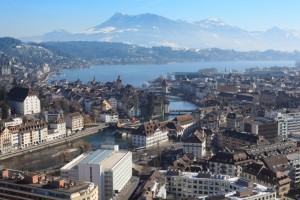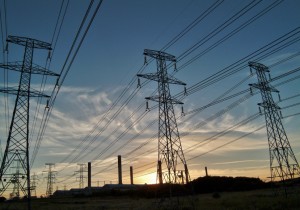Professor Jo Haigh, Co-director of the Grantham Institute reports back from the Climate Parliament meeting in Lucerne, 12 June 2015.
 I have just found a seat on the train from Lucerne to Zurich airport. It is absolutely packed, I suppose, with people going away for the weekend. Staring through the window at the snow-capped mountains, and having spent the day at an inspirational conference set by the beautiful lake, I am wondering quite why anyone would want to leave.
I have just found a seat on the train from Lucerne to Zurich airport. It is absolutely packed, I suppose, with people going away for the weekend. Staring through the window at the snow-capped mountains, and having spent the day at an inspirational conference set by the beautiful lake, I am wondering quite why anyone would want to leave.
I have been at a meeting of the Climate Parliament. I only learned of this organisation recently but it is rather splendid – a group of legislators from across the world who are concerned about climate change and looking to influence governments to act. Seventy attendees came together to discuss the potential for a Global Energy Internet: an international electricity grid based on regional renewable energy sources.
Attendees were diverse – including MPs from four continents, industrialists, academics and representatives from energy and climate agencies. Simultaneous translation was provided between French, Spanish, Chinese and English, although that can’t have covered all the first languages represented. Fortunately my talk was first up so I could then concentrate on the rest.
The challenges of a global energy grid
For me a highlight was Li Junfeng, Director General of the Chinese National Centre for Climate Change Strategy and International Cooperation, who spoke on China’s energy demands, provision and ambitions for decarbonisation. He spoke of a “solar Silk Road for the 21st century” and noted the need for revolutions in energy production and for technical innovation with international cooperation on R&D in renewables: “Helping China is helping the World” he said.
Lei Xianzhang, of the State Grid Corporation of China, was up next discussing some of the technical issues and describing the construction of new wind and solar plants (grown by factors of 37 and 350 respectively since 2006) as well as very long (thousands of kilometres) high voltage DC transmission cables.
 The political and technical challenges which have faced attempts to construct an energy grid across the Middle East and North Africa were elaborated by Tareq Emtairah, Director of the Centre for Renewable Energy and Energy Efficiency in Cairo. In the absence of an electricity market there has been very little exchange coordinated to date, but the delegates from Jordan, Morocco and Tunisia remained upbeat.
The political and technical challenges which have faced attempts to construct an energy grid across the Middle East and North Africa were elaborated by Tareq Emtairah, Director of the Centre for Renewable Energy and Energy Efficiency in Cairo. In the absence of an electricity market there has been very little exchange coordinated to date, but the delegates from Jordan, Morocco and Tunisia remained upbeat.
National energy security concerns were foremost in the minds of colleagues from Senegal and Peru. Efforts to connect to international grids were seen as a second priority. I could see their point, but perhaps they were reassured that the proposed networks could be established to the advantage of all.
Damien Ernst, an energy economist from the University of Liège, delivered an inspirational message: his calculations suggest that large scale facilities of solar and wind energy, with long transnational interconnections can provide energy cheaper than fossil fuels. Construct the grid first, he declares, and the incentive to develop renewables will follow.
It is a shame I have to miss tomorrow’s discussions, which will focus on finances and start to develop an action plan, but I have to attend my father’s 90th birthday party. If I live to 90, or 80, or even 75(?) perhaps I will see established an international energy internet. It is a fantastic vision.